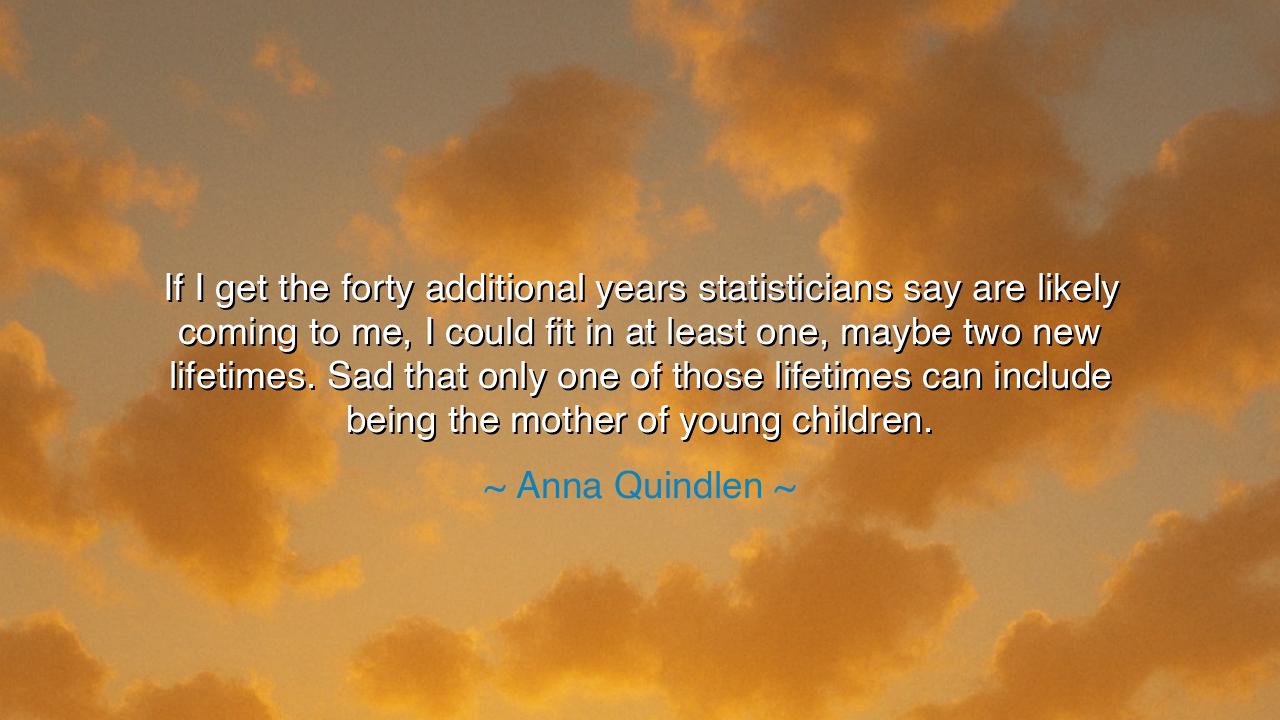
If I get the forty additional years statisticians say are likely
If I get the forty additional years statisticians say are likely coming to me, I could fit in at least one, maybe two new lifetimes. Sad that only one of those lifetimes can include being the mother of young children.






The words of Anna Quindlen, “If I get the forty additional years statisticians say are likely coming to me, I could fit in at least one, maybe two new lifetimes. Sad that only one of those lifetimes can include being the mother of young children,” are filled with the quiet ache of wisdom—a reflection on the passage of time, the impermanence of seasons, and the bittersweet beauty of motherhood. Beneath their gentle tone lies a truth as old as human existence: that life, though long in years, is brief in its moments, and that the most precious seasons cannot be lived twice. Quindlen’s lament is not of despair, but of reverence—for she speaks as one who has glimpsed the fragility of time and understood that love, like childhood, blooms only once before it is gone.
Her words arise from the heart of the modern human condition—a time when longevity has increased, but the heart remains bound to memory and meaning rather than mathematics. “Forty additional years,” she muses, is a gift many would envy. Yet she feels a sadness not because of death’s nearness, but because of life’s irreversibility. To have “one lifetime” in which to hold small hands, to read bedtime stories, to witness innocence unguarded—that is the divine portion of motherhood. It passes swiftly, replaced by silence and independence, and though the years that follow may bring new achievements and roles, none can reproduce the sacred simplicity of nurturing the young. In that recognition lies both sorrow and awe.
The ancients, too, knew the pain of transience. The philosopher Heraclitus taught that no man steps into the same river twice, for both man and river have changed. Quindlen’s reflection echoes this wisdom. A mother may live many lives within one span—daughter, lover, writer, teacher—but the mother of young children lives in a world unlike any other, a realm of pure devotion and immediacy. When that season ends, it cannot be recaptured, not because love fades, but because time transforms love. The cradle gives way to conversation, the child’s small dependence to the adult’s distant gratitude. Thus, every life, however long, is built of fleeting sanctuaries that cannot be revisited—only remembered.
There is a parallel in the life of Queen Victoria, who after the death of her beloved Prince Albert found herself surrounded by children grown and gone. Though she ruled an empire, she often wrote in her diaries of longing for the years when her children were small—those brief mornings when the world was only laughter and affection. She lived many lifetimes afterward: as sovereign, as widow, as symbol of an age. Yet none equaled that first, humble role of motherhood in its beginning, when her hands, not her crown, were the measure of comfort. Quindlen’s sadness reflects the same universal truth: that power and longevity cannot restore what time, in its quiet justice, moves forever forward.
But there is no bitterness in Quindlen’s words. Her sadness is sacred, for it is the sadness of appreciation. To mourn the passing of a season is to honor its beauty. Those who never pause to grieve what has gone cannot truly value what remains. The mother who feels the ache of her children growing is also the mother who loved them fully, who was present enough to notice their smallness before it disappeared. The sorrow she names is the echo of joy well-lived. It is not the regret of neglect, but the ache of gratitude.
Through her reflection, Quindlen offers a profound lesson to all generations: that life must be lived with awareness, for each chapter ends more swiftly than the heart expects. One may live forty more years and fill them with triumphs, friendships, and discoveries—but no amount of experience can repeat a moment once its hour has passed. The wise therefore live not for longevity, but for depth. They do not seek to stretch time, but to saturate it with meaning. In this way, every season, no matter how brief, becomes eternal in memory.
So let this teaching be passed down: honor each stage of your life as if it were its own lifetime. Do not rush the present in search of what’s next, nor cling to what has already faded. Be fully alive in the small, irreplaceable moments that compose your days—the laughter of your children, the quiet of evening, the miracle of ordinary love. For as Anna Quindlen reminds us, time will grant you many years, but only one chance to live each of your seasons. To recognize that truth is not to despair, but to live with reverence—for it is through the awareness of impermanence that we finally learn to cherish the eternal.






AAdministratorAdministrator
Welcome, honored guests. Please leave a comment, we will respond soon